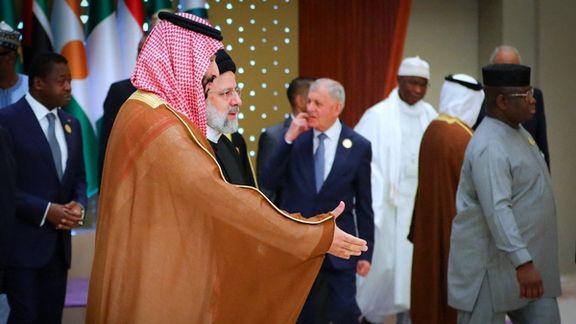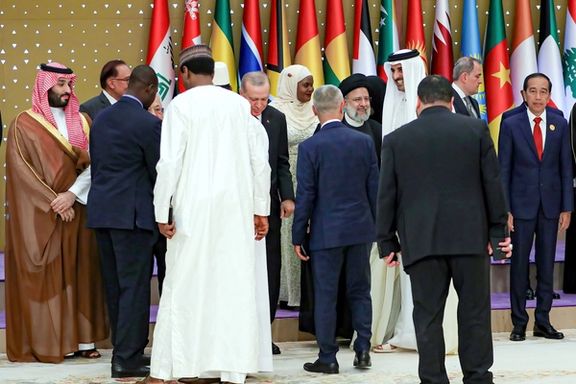Iran's President Calls On Islamic Countries To Sanction Israel

Iranian President Ebrahim Raisi on Saturday hailed the Palestinian group Hamas for its war against Israel and urged Islamic countries to launch sanctions against Israel.

Iranian President Ebrahim Raisi on Saturday hailed the Palestinian group Hamas for its war against Israel and urged Islamic countries to launch sanctions against Israel.
"There is no other way but to resist Israel, we kiss the hands of Hamas for its resistance against Israel," Raisi said in his address to a joint Islamic-Arab summit in Riyadh. He also called on Islamic countries to impose oil and goods sanctions on Israel.
The summit called on Saturday for an immediate end to hostilities in Gaza, declaring that Israel is responsible for "crimes" against Palestinians.
Crown Prince Mohammed bin Salman, Saudi Arabia's de facto ruler, gathered Arab and Muslim leaders in Riyadh as the kingdom has sought to exert its influence to press the United States and Israel for an end to fighting in Gaza.
The Iranian regime praised Hamas as soon as news about the October 7 attack emerged and immediately organized street celebration. However, it has refrained from direct involvement in the fighting. However, its Iraqi, Syrian and Yemeni proxy forces have launched more than 40 rocket and drone attacks against American forces in the region, not deterred by a large deployment of US naval forces in the region.
Dozens of leaders including Iran’s Raisi, Turkish President Tayyip Erdogan, Qatar's Emir Sheikh Tamim bin Hamad Al Thani and Syrian President Bashar al-Assad, who was welcomed back into the Arab League earlier this year, attended the meeting.

Prince Mohammed said the kingdom affirms its "condemnation and categorical rejection of this barbaric war against our brothers in Palestine".
"We are facing a humanitarian catastrophe that proves the failure of the Security Council and the international community to put an end to the flagrant Israeli violations of international laws," he said in an address to the summit.
Palestinian President Mahmoud Abbas said Palestinians are facing a "genocidal war" and called on the United States to end Israeli "aggression".
As he headed to Riyadh, Raisi said it was time for action over the conflict rather than talk.
The Middle East has been on edge since Hamas fighters rampaged into Israel on October 7, killing 1,200 people, mostly civilians.
Since then, Israel has escalated its assault on Gaza, where 11,078 people had been killed as of Friday, 40% of them children, according to Hamas officials. It is not possible to independently verify these numbers.
ARAB COUNTRIES DIVIDED
Fighting intensified overnight into Saturday near Gaza City's overcrowded hospitals, Palestinian officials said.
The war has upended traditional Middle East alliances as Riyadh has engaged more closely with Iran, pushed back against US pressure to condemn Hamas and put on hold its plans to normalize ties with Israel.
Raisi's trip to Saudi Arabia is the first by an Iranian head of state since Tehran and Riyadh ended years of hostility under a Chinese-brokered deal in March.
Erdogan called for an international peace conference to find a permanent solution to the conflict between Israel and Palestinians.
"What we need in Gaza is not pauses for a couple of hours, rather we need a permanent ceasefire," Erdogan told the summit.
The kingdom had been scheduled to host two extraordinary summits, the Organization of Islamic Cooperation, and the Arab League, on Saturday and Sunday. The joint summit will replace the two gatherings in light of the "extraordinary" Gaza situation, the Saudi Foreign ministry said.
Hamas called on the summit to take "a historic and decisive decision and move to stop the Zionist aggression immediately".
"We call on Arab and Muslim leaders ... to put pressure on the American administration, which bears direct responsibility in the genocidal war that our people are facing in the Gaza Strip," a statement from the Palestinian militant group said.
Arab foreign ministers were divided as some countries, led by Algeria, called for a complete cut in diplomatic ties with Israel, two delegates told Reuters.
Other Arab countries, which have established diplomatic relations with Israel, pushed back, stressing the need to keep channels open with Netanyahu's government, they said.
With reporting by Reuters